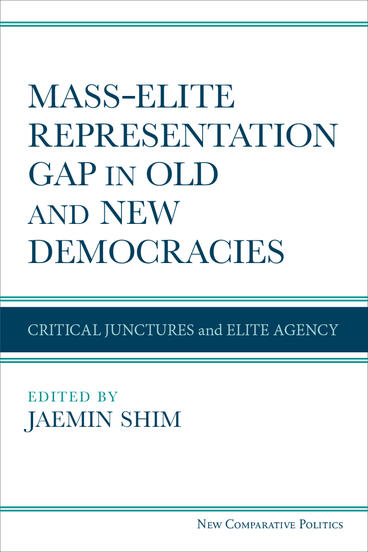Mass–Elite Representation Gap in Old and New Democracies
Critical Junctures and Elite Agency
What happens when voters and their representatives don’t agree?
Description
The alignment of voter preferences and the preferences of their parliamentary representatives has long been understood as a vital part of representative democracy. However, recent decades have seen a considerable increase in such gaps between mass (the public) and elite (the representatives) policy preferences, appearing not just as isolated or single-topic issues, but rather across the spectrum of political dimensions. The negative effects can include decreased trust and voter engagement, dissatisfaction with democratic ideals and process, and even democratic backsliding.
Mass–Elite Representation Gap in Old and New Democracies brings together a global array of scholars to examine the issue from new angles, drawing on evidence from North Africa, East Asia, Southeast Asia, South America, and Europe. This global-level analysis of different representation gaps demonstrates that these gaps vary in content, structure, and the timing of formation. Moreover, recognizing the socially, culturally, and internationally embedded nature of party politics, the contributors in the volume trace the historical origin of gaps observed in different world regions. The findings show that earlier choices made by political elites during historical-critical junctures lead to preference mismatch, undermining the quality of democratic representation.
Jaemin Shim is Assistant Professor at Hong Kong Baptist University and Associate Fellow at the German Institute for Global and Area Studies.
Reviews
“In this carefully edited volume, Jaemin Shim and his collaborators break new ground in the study of mass–elite representation gap—both in theoretical and empirical terms. The global approach they take works well in combination with the context-sensitivity of the individual case studies.”
- Patrick Köllner, German Institute for Global and Area Studies
“Shim’s edited volume is a major contribution to the study of representation thanks to its geographical reach, historical focus and qualitative nuance. It powerfully illustrates the complexity of substantive representation in various world regions, and it compels us to consider its importance for democratic legitimacy.”
- Diego Fossati, City University of Hong Kong
“This volume, studying mass–elite congruence, provides much needed nuance thanks to a sensitive engagement of the interaction between elite agency, structure of political competition, as well as their interacting historical development. Extending beyond established democracies, the volume provides not only novel empirical detail, but theoretical innovation concerning the content, structure, and timing of the mass–elite gap.”
- Jan Rovny, Center for European Studies and Comparative Politics, Sciences Po
“Amidst rising citizen discontent with established parties and institutions, the topic of elite–mass differences is more timely than ever. The editor’s useful conceptual framework and in-depth case studies on political elites by country experts make this volume a valuable addition for all students of comparative politics.”
- Willy Jou, Waseda University

